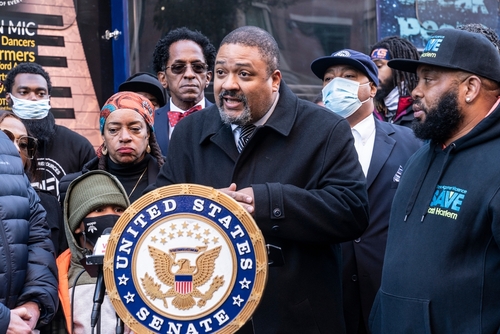
In the face of increased crime in New York City, Manhattan District Attorney Alvin Bragg reversed his administration’s “soft on crime” tactics for prosecuting criminals on Friday.
The Goal of the Initial Memo
According to the letter, “the goal of the January 3rd memorandum was to give ADAs structure for how to handle situations in the best interests of public safety and justice.”
“We found the memorandum served as a source of uncertainty, rather than clarity, in our collective experience. According to what I said in the office, you were chosen because of your acute judgment, as well as your expertise in all of your cases.”
A month into his tenure, Manhattan District Attorney Alvin Bragg on Friday sought to clarify some of his prosecutorial policies that fueled criticism he is soft on crime. https://t.co/hl8e0k0YtH
— World News Tonight (@ABCWorldNews) February 4, 2022
Per information from the New York City Police Department, overall serious crime in New York City increased by approximately 38.5 percent in January. This is especially in contrast to the same month and previous year during Bragg’s brief tenure as mayor.
Political watchers and members of the city’s law enforcement community expressed displeasure with Bragg’s message, which was sent on January 3.
Commissioner Keechant Sewell of the New York Police Department expressed “grave worry” about how the regulations would affect officers and the general public. According to the New York Times, her concerns were addressed in a subsequent meeting between the two.
As stated by Bragg, the January letter, which featured a slew of “rules and procedures” on how certain offenses in the district should be handled, was intended to be used just as a reference.
Initial Statement and Adjustments
There were a list of charges that should not be used in trespassing situations, failure to pay user fees for public transit, marijuana crimes, assaulting a police officer, prostitution, and other offenses in the January letter.
In addition, according to the January memo, commercial intrusions should not be prosecuted as felonies. An act encompassing theft of property from a commercial building could have been charged under the Penal Code’s Section 140.25(2).
That’s because the institution is essentially part of a larger structure containing dwellings that will only be charged under Section 140.20, according to the memo issued on January 3.
Manhattan District Attorney Alvin Bragg scrapped two policies Friday following immense public backlash as the city sees a rise in violent crime.
Keep fighting. We are winning.
— 🍊🇺🇸MARGO🇺🇸🍊 (@m_keenum) February 4, 2022
Per the document released on Friday, commercial thefts should be prosecuted as felonies if the assailant has a pistol, knife, or other armaments that have the potential to cause bodily injury.
In addition, the document stated retail thefts that do not result in physical injury should not be prosecuted as felonies.
Additionally, Bragg expressed in his email on Friday that the department would prosecute anyone who attempts to damage or successfully hurt a police officer.
Bragg explained the email he sent out on Friday was meant to restate remarks he made during a team meeting on January 20, during which he discussed concerns about the memo he sent out on January 3.
















